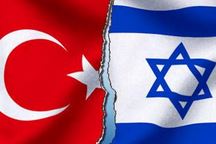Israeli Prime Minister Benjamin Netanyahu spoke to Turkish Prime Minister Recep Tayyip Erdogan on March 22 and offered Israel’s apology for the 2010 ‘Mavi Marmara’ incident. In that incident, nine Turkish nationals were killed by Israeli Special Forces who raided the Marmara as it sailed to the Gaza Strip as part of a larger flotilla. The incident resulted in an unprecedented crisis in the relations between the two countries, with Turkey demanding an official apology before restoring ties between the two nations.

The recent development was reportedly mediated by the US administration, and particularly by Secretary of State John Kerry, who arrived in Israel on March 19 ahead of President Obama’s visit. The President himself was present at the time of the conversation between the two leaders on March 22, shortly before leaving to Jordan.
Netanyahu apologized for operational mistakes that led to the loss of life, and pledged to compensate the families of those killed via a humanitarian fund. He also stressed that Israel has lifted certain limitations on the entry of civilian goods to the Gaza Strip in the time that passed since the incident. Those three have issues constituted Turkey’s demands for reconciliation since the incident.
Prime Minister Erdogan accepted Netanyahu’s apology. The two leaders agreed to re-normalize ties between the two nations and to re-appoint their respective ambassadors. Turkey will also halt all legal procedures against Israeli military officials involved in the Mavi Marmara incident.
The timing of the apology and the subsequent reconciliation is the result of several strategic considerations on behalf of both Netanyahu and Erdogan, primarily based on the grave regional implications of the escalating situation in Syria.
Netanyahu currently heads a new government, which allows him to implement significant political moves with little domestic opposition. The premier likely capitalized on the fact that former Foreign Minister, Avigdor Lieberman, is currently not serving in his cabinet, due to an ongoing trial. Lieberman, who traditionally voiced a strong opposition to meeting Turkey’s demands, condemned the move, but remains unlikely to hinder the stability of Netanyahu’s new cabinet only several days after its inauguration.
The second incentive for Netanyahu’s apology is President Obama’s visit to Israel. As the visit displayed a new phase in the previously frosty relationship between the two leaders, we assess Netanyahu was willing to grant Obama this important diplomatic achievement, not only as a means to uphold U.S. interests in the region, but also as a way to safeguard their improving relations on the personal level.
The deteriorating situation in Syria and the increasing concern over the fate of the Assad regime’s chemical weapons nonetheless remain the primary reasons for the timing of Turkish-Israeli reconciliation. While the U.S. has pushed for Israeli-Turkish reconciliation during the last three years, the need to create a sustainable coalition in the face of a possible escalation involving chemical weapons in Syria, or a spillover of the conflict outside its borders, likely boosted such efforts in recent months. As the threat emanating from such a scenario remains a central concern for both Jerusalem and Ankara, it is likely that all parties were willing to make certain concessions to protect their own interests, as well as those of the U.S.
The final version of the apology indicated that Turkey has waived some of its previous demands from Israel. The apology for “operational mistakes” during the raid and the formation of a humanitarian fund were previously offered by Israel but denied by Turkey. Ankara’s willingness to concede these terms, in addition to waiving their previous demand for a complete removal of the blockade on the Gaza Strip, further indicates that the timing of the apology has been largely affected by the broader geo-political situation in the region from Turkey’s point of view.
It should be noted that the agreement also follows progress toward a cessation of hostilities with the separatist Kurdistan Workers’ Party (PKK). Abdullah Ocalan, the imprisoned leader of the separatist group, has called for a ceasefire and the withdrawal of PKK militants from Turkish territory on March 21. While Ankara has thus far reacted cautiously to the move, these has been a notable Turkish effort to promote peace talks with the Kurds in recent months, signaling a notable change in their policy during a deadly year of clashes with militants in the southeastern provinces.
Although many Turks see this issue as a domestic problem, it should not be ruled out that Erdogan is to some extent reassessing his assertive foreign policy which has been witnessed since 2003. The “Zero-Problems” policy, which focused on restoring ties between Ankara and other Muslim and Arab countries and taking a more assertive role in Syria, has not proved completely beneficial, which may serve as one explanation to the recent agreements with both Israel and the PKK. That being said, we assess these shifts remain limited and tactical in their nature, seeking to protect Turkey’s interests in the face of a possible spillover from Syria.
Ankara’s policy, particularly towards Israel, will likely continue to be marked by support for Israel’s rivals in the Hamas regime in the Gaza Strip, as long as it is led by a conservative Islamist party. In this sense, the relations between the two nations remain unlikely to return to their peak of intimacy that characterized the 1990’s, but will likely see renewed cooperation on the security and military fronts, especially with regard to the threats emanating from Syria. Turkey’s demonstrated willingness to cooperate with the United States on a contentious issue such as reconciliation with Israel, further highlights a possibly more cooperative role in other issues such as the Iranian nuclear crisis, and possibly playing a positive role in Palestinian reconciliation.
Click here to receive ongoing in-depth reports on strategic issues in the Middle East.